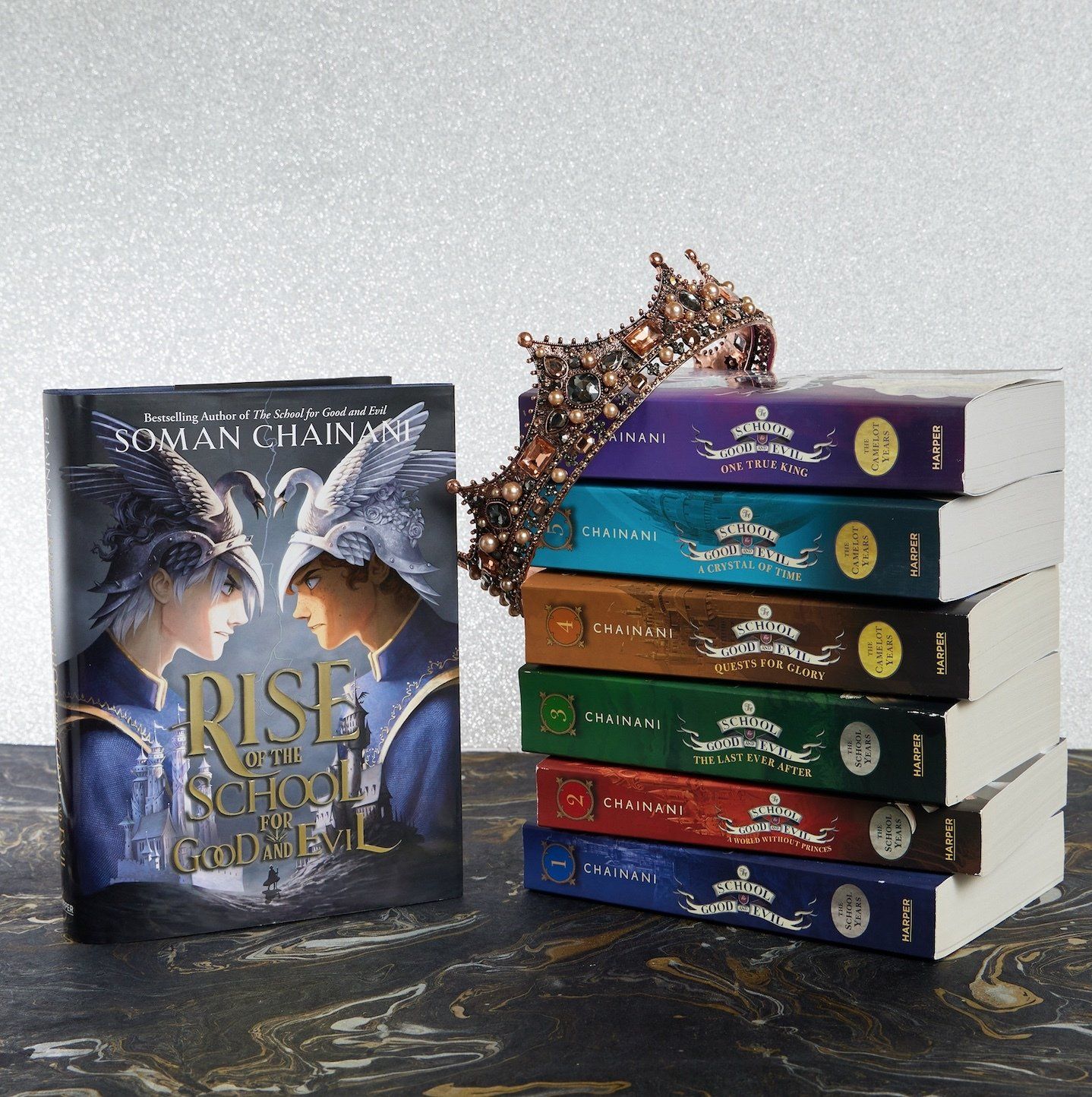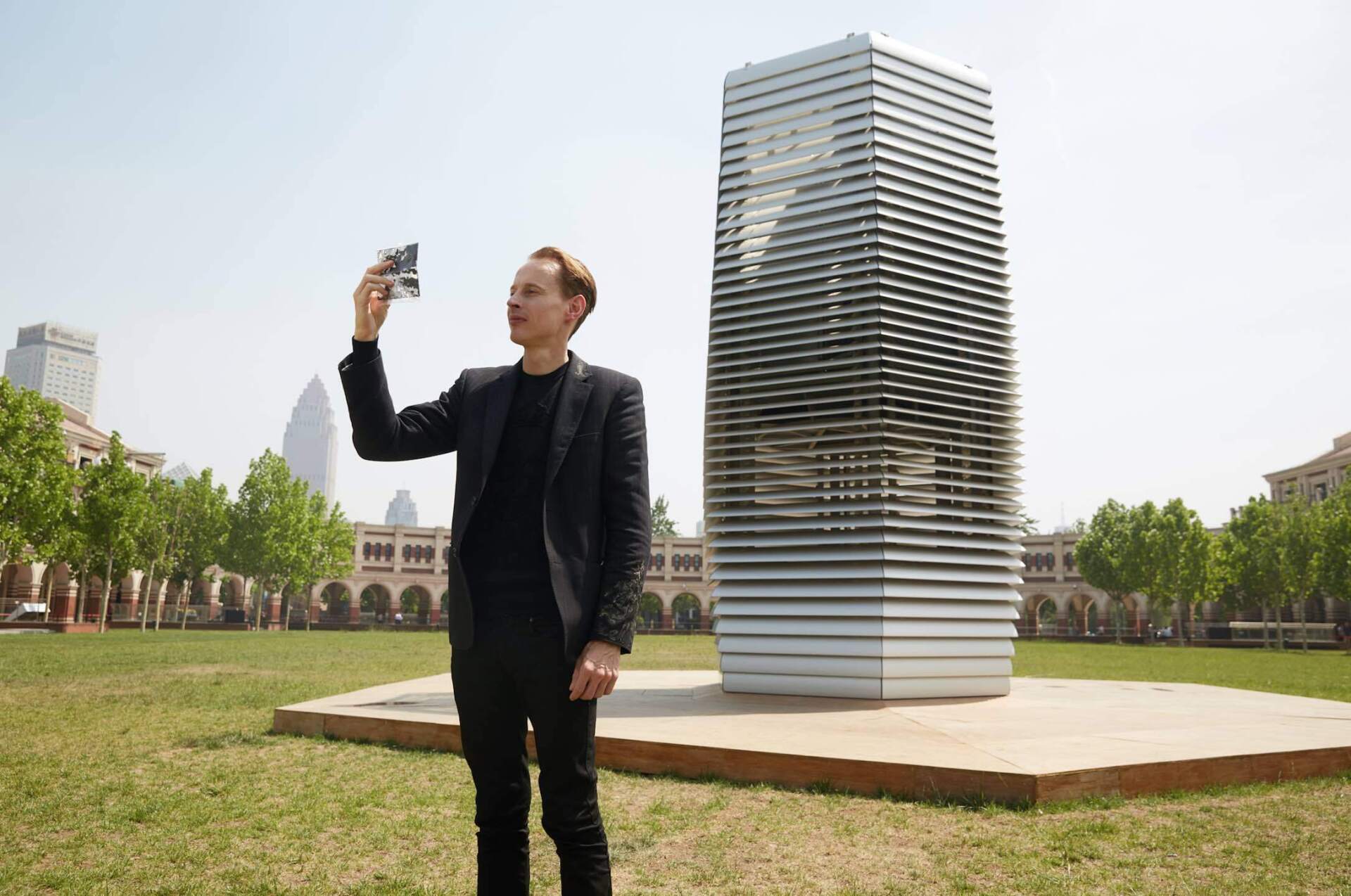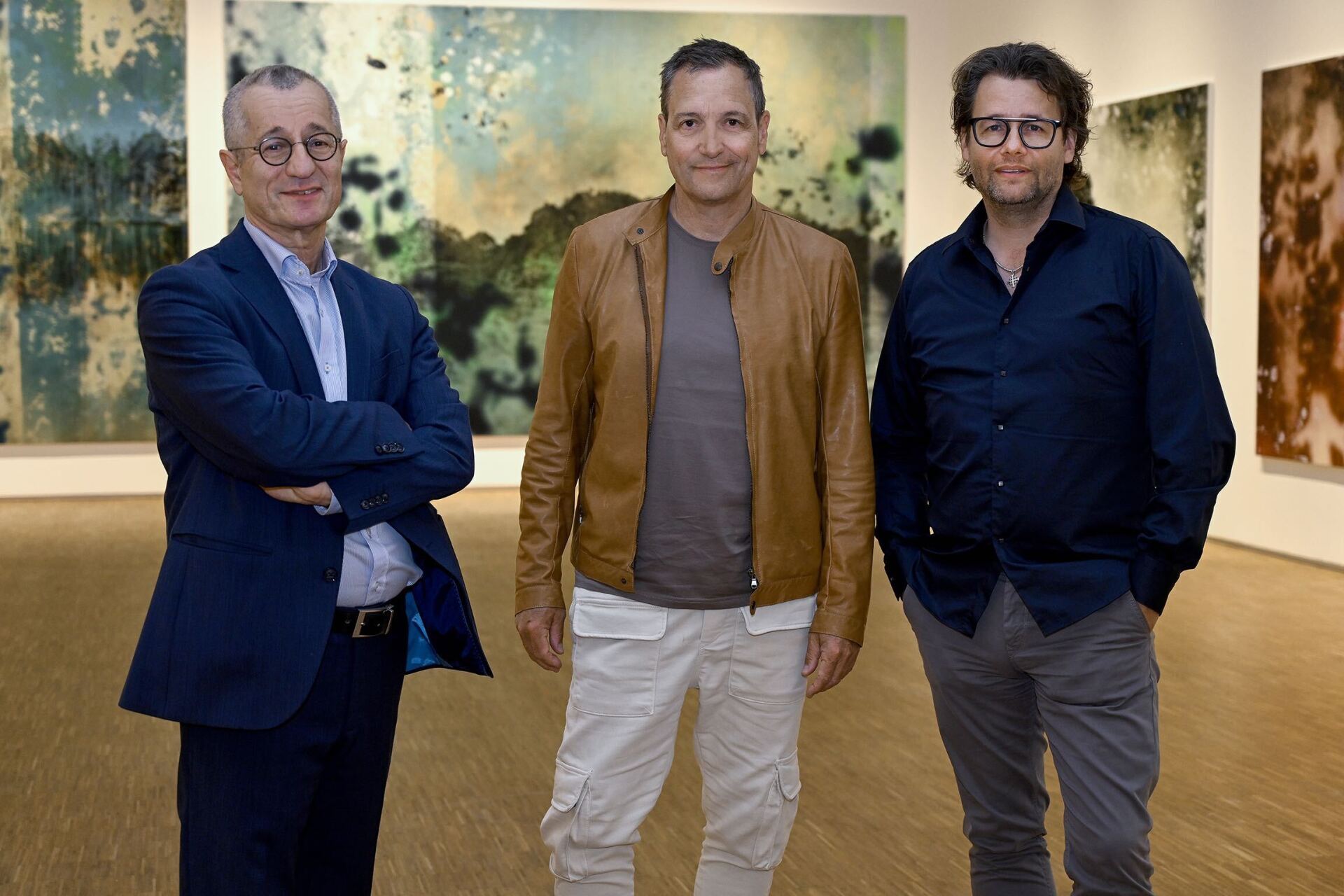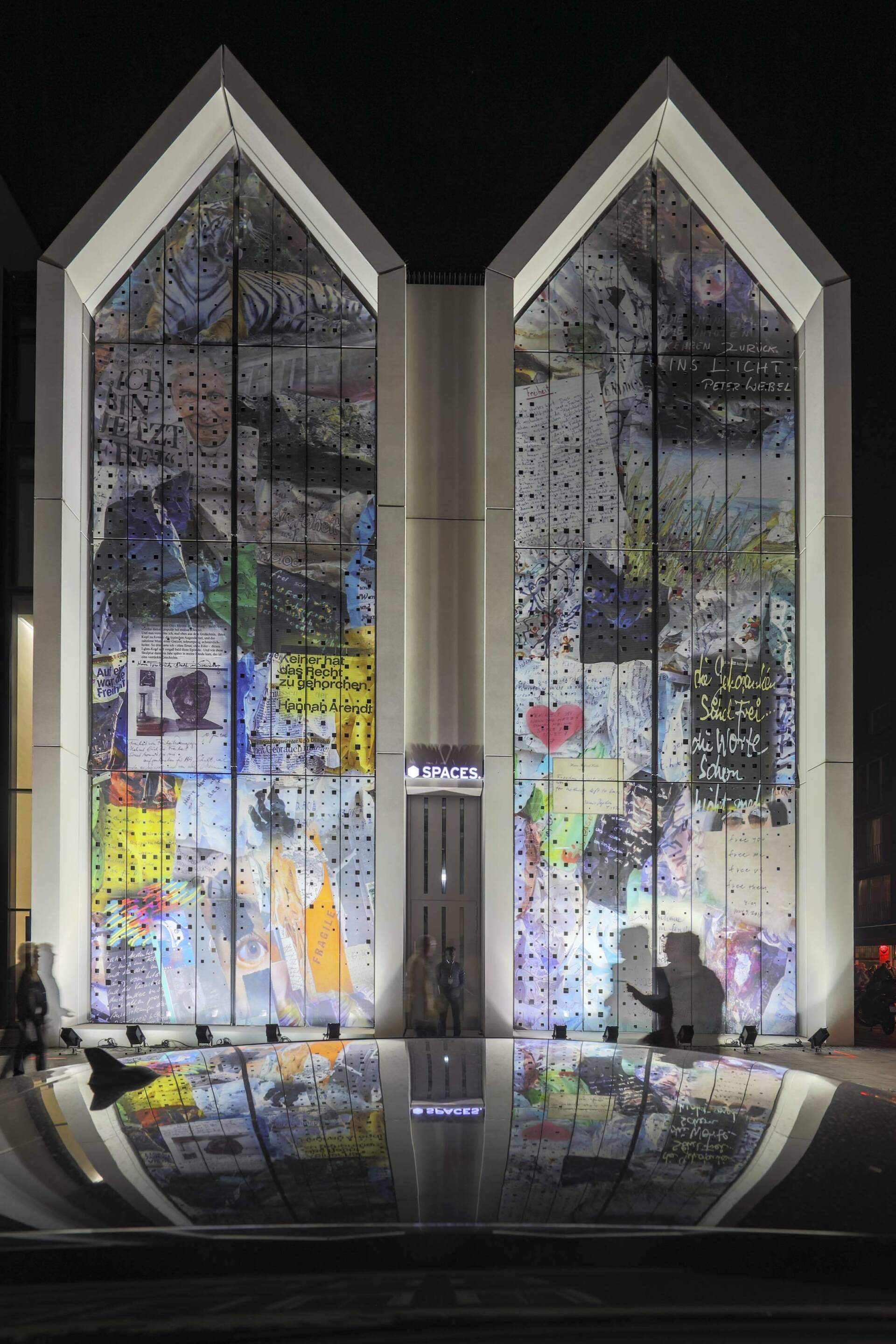Personalities / Books - 24 June 2022 - by Lizzie Fedi
"The School for Good and Evil" - Interview with Soman Chainani.
A new world of diversity, religion, morality and ethics.
"Children should not label themselves, but be open and be everything at once."
German version of the interview below

Soman Chainani, author of "The School for Good and Evil" and many more
©Soman Chainani
The Netflix film adaptation of the „The School for Good and Evil" series by New York Times bestselling author Soman Chainani is eagerly awaited worldwide. It will be directed by Paul Feig, known for "Ghostbusters", "Bridesmaids" and "A Simple Favor". The film adaptation follows best friends Sophie (Sophia Anne Caruso) and Agatha (Sofia Wylie) into the enchanted school for young heroes and villains and how they find themselves on opposite sides of the battle between good and evil. The cast is extremely high profile and features Charlize Theron, Kerry Washington, Michelle Yeoh and Laurence Fishburne as the school's professors and headmasters. Cate Blanchett, Kit Young, Rachel Bloom, Peter Serafinowicz, Mark Heap and Patti LuPone will also star. The teaser for the film has just been released on Netflix, but the trailer and date of the film are still unknown.
Soman Chainani studied English Literature at Harvard University at Harvard University. His first course at Harvard was on the subject of "fairy tales". He realised that the Disney films he loved were based on much more complex, darker stories. There sprang up in him a desire to break down what he called the Disney matrix of good and evil, which he was convinced was corrupting children's mindsets.
In „The School for Good and Evil“, truth and lies, good and evil - both sides claim to be good, both sides claim to be telling the truth - are mixed together. The power of a lie that is perceived as true and determines people's behaviour is at the heart of the book.
Soman Chainani has created a new complex world where it only seems to be about fairy tales but is filled with morality, ethics, diversity and lgbtq. What is amazing is that Soman Chainani wrote the book more for adults and only later decided that it should be for children. He thought about how the book could be read by children and then left out the age of the characters. I
In the interview, you also learn how he thought about the world of children. His message with his books is that children should get away from the idea of labelling themselves and having some idea of who they are.
To the interview:

"The School for Good and Evil"
©Soman Chainani
Alethea Magazine: Do you think your readers will be satisfied with the film and that the movie lives up to the book?
Soman Chainani: I think the interesting thing about movies is that they are a completely different media. So everybody who reads the books has a different version in their head. I think that the job of a movie is to capture the spirit and still be faithful to the book. And this one absolutely is.
I don’t think a movie can ever replicate the experience of a book especially because if you think about how long it takes to read a book. We’re talking about 9 to 10 hours while a movie is only two hours. So even in terms of content, you’re only going to get a fifth of what the book contains. But this one is a beautiful adaptation and I think everyone is going to love it. However, the books and the movies are going to be two different things.
Alethea Magazine: As now with the movie adaption how do you feel about your ideas being read and that they influence people all over the world?
Soman Chainani: I think that is what is going to be so exciting. So far the books have done what you know books can do which is move their way through the world and people have been able to discover them because of people like you recommending them to their friends. Everyone is having this emotional experience and then wanting someone else they know to have it.
With movies it’s kind of this big bomb all at once where everyone learns of this thing and so with the movie, they will be a whole new crowd of readers. But I will obviously remember the readers who have been there before the movies.
Alethea Magazine: Did you originally write the book for adults or for children?
Soman Chainani: I didn’t really think about it so much. I didn’t know the different audiences and things like that in terms of age groups. And so I wrote it kind of more for adults and then later I thought it was going to be like the book „Wicked“ which was an adult book.
Only over time we thought that this might be for younger audiences and then how we can tailor it. But we didn’t really change it that much. The only big change I ever made was to take out the characters ages. And we never really specified how old they were.
Alethea Magazine: What do you feel is an important message to children?
Soman Chainani: I think to me it’s that we often tell kids „You’re good at this so be a good person“ or we try to label them, give them these identities to hold on to and that can shape how they are in life.
And I think they become slight inflexible and so this is why I try to teach them to get away from this idea of labelling yourselves and having any kind of conception of who you are. To be a little more open and to be everything all at once.
Alethea Magazine: What do you think of the costumes in the movie and do we get to see Sophies pink ball gown at the end of the movie?
Soman Chainani: The costumes are incredible and the costume designer Renée Ehrlich Kalfus, she is an absolute genius. She works for the director Paul Feig with all these beautiful costumes for everybody.
But I think we take a lot of license with exactly what is described in the book for different costumes because we wanted to be able to really present the different fashions rather than typical uniforms.
For the pink ball gown moment, I know she is in something amazing and I know there is pink in it but I just don’t know if it’s classic or not.
Alethea Magazine: I am definitely going to be surprised at the end.
Soman Chainani: Yeah, I think that is the fun of it too. To really mix up somebody’s outfit so that they aren’t exactly 100% what we imagined in the book.
Alethea Magazine: At the beginning of Agathas and Sophies first teaching lessons, Agatha saw for the first time wish fishes that can show what your soul wants the most. As of this moment what would the fishes see when they look into your soul?
Soman Chainani: Oh, that’s a good question. I think for me it changes on a daily basis. I mean, I think for me I probably wouldn’t wish for something selfish like three or four months ago but I just think more and more that the world is in a little bit of trouble especially the United States in terms of just everything is falling out of control.
I would wish that everything would settle in and we sort of go back to a place where it is a little more balanced. That the world would just be a little more settled.
Alethea Magazine: While writing all those incredible characters such as Sophie, Agatha and Lady Lesso and many more, how do you see a strong, independent woman? Like how do you come up with them?
Soman Chainani: I think for me it was always the idea of when you write a female character if you create them whether or not defined by their relationship with men. I think was the big thing for me.
So all these characters and every single one of my female characters their relationship with men is around them. Lady Lesso, we don’t care. Professor Dovey, we don’t care. Ultimately Sophies and Agathas friendship is more important.
And then Sophie who is defined by men in a lot of ways but she always has the upper hand. So for me I think that was the key that none of these woman are being presented through the eyes of a man.
Alethea Magazine: From all the villains in every fairytale which one is your favorite and why ?
Soman Chainani: I think the witch in “Hänsel and Gretel“ because I always thought that it was such a scary setup to lure children in a strange, unknown and still luring place.
Alethea Magazine: What is your favorite Madonna song?
Soman Chainani: “Frozen“ was always my favorite and I think that it became one of Sophies theme songs. That song always stood up to me over the years.
Alethea Magazine: Mr. Chainani, thank you very much for the interview.
The interview was conducted by Lizzie Fedi
24.6.2022
German version
By Lizzie Fedi, 24.6.2022

"The School for Good and Evil"
©Soman Chainani
Personalities / Books - 23 Juni 2022 - von Lizzie Fedi
"The School for Good and Evil" - Interview mit Soman Chainani
Eine neue Welt von Vielfalt, Moral und Ethik.
Kinder sollten sich nicht etikettieren, sondern offen sein und alles auf einmal sein
Weltweit wird mit Spannung die Netflix Verfilmung der "The School for Good and Evil"-Reihe von New York Times Bestseller Autor Soman Chainani erwartet. Die Regie wird Paul Feig führen, der bekannt ist für Ghostbusters", Bridesmaids" und A Simple Favor". Die Verfilmung folgt den besten Freundinnen Sophie (Sophia Anne Caruso) und Agatha (Sofia Wylie) in die verwunschene Schule für junge Helden und Schurken und wie sie sich im Kampf zwischen Gut und Böse auf der jeweils anderen Seite wiederfinden. Die Besetzung ist äusserst hochkarätig und zeigt Charlize Theron, Kerry Washington, Michelle Yeoh und Laurence Fishburne als Professoren und Schulleiter der Schule. Cate Blanchett, Kit Young, Rachel Bloom, Peter Serafinowicz, Mark Heap und Patti LuPone werden ebenfalls mitspielen. Der Teaser zum Film ist gerade auf Netflix erschienen, aber der Trailer und das Datum des Films sind noch unbekannt.
——
Soman Chainani studierte an der Harvard University Englische Literatur. Sein erster Kurs in Harvard hing über das Thema „Märchen“. Er erkannte, dass die von ihm geliebten Disney-Filme auf viel komplexeren, dunkleren Geschichten basierten. Da entsprang in ihm der Wunsch, die, so wie er es nannte, Disney-Matrix von Gut und Böse aufzubrechen, von der er überzeugt war, dass sie die Denkweise der Kinder verdarben.
In "The School for Good and Evil" vermischen sich Wahrheit und Lüge, Gut und Böse, beide Seiten behaupten, gut zu sein, beide Seiten behaupten, die Wahrheit zu sagen. Die Macht einer Lüge, die als wahr empfunden wird und das Verhalten der Menschen bestimmt, steht im Mittelpunkt des Buches.
Soman Chainani hat eine neue komplexe Welt erschaffen, bei der es nur scheinbar über Märchen geht, aber gefüllt ist mit Moral, Ethik, Vielfalt und lgbtq. Erstaunlich ist, dass Soman Chainani das Buch eher für Erwachsene schrieb und erst später beschloss, dass es für Kinder sein sollte. Er überlegte sich, wie das Buch für Kinder zu lesen sein und ließ dann das Alter der Figuren heraus.
Im Interview erfährt man auch, wie er sich in die Welt der Kinder hinein dachte. Seine Botschaft mit seiner Büchern ist, dass sich Kinder von der Vorstellung lösen sollten, sich selbst zu etikettieren und irgendeine Vorstellung davon zu haben, wer sie sind.
Zum Interview:
Alethea Magazine: Glauben Sie, dass Ihre Leser mit dem Film zufrieden sein werden und dass der Film dem Buch gerecht wird?
Soman Chainani: Ich denke, das Interessante an Filmen ist, dass sie ein völlig anderes Medium sind. Jeder, der die Bücher liest, hat also eine andere Version im Kopf. Ich denke, die Aufgabe eines Films ist es, die Stimmung einzufangen und trotzdem dem Buch treu zu bleiben. Und das ist bei diesem Film absolut der Fall.
Ich glaube nicht, dass ein Film jemals die Erfahrung eines Buches wiedergeben kann, vor allem, wenn man bedenkt, wie lange es dauert, ein Buch zu lesen. Wir sprechen hier von 9 bis 10 Stunden, während ein Film nur zwei Stunden dauert.
Selbst vom Inhalt her erfährt man nur ein Fünftel von dem, was das Buch enthält. Aber diese Verfilmung ist wunderschön, und ich denke, jeder wird sie lieben. Allerdings werden die Bücher und die Filme zwei verschiedene Dinge sein.
Alethea Magazine: Wie fühlen Sie sich selbst, da Ihre Ideen gelesen werden und Menschen auf der ganzen Welt beeinflussen?
Soman Chainani: Ich denke, das ist es, was so aufregend sein wird. Bisher haben die Bücher das getan, was man von Büchern kennt: Sie haben sich ihren Weg durch die Welt gebahnt, und die Menschen konnten sie entdecken, weil Leute wie Sie (Lizzie Fedi; Anmerkung der Redaktion) sie ihren Freunden empfohlen haben.
Jeder macht diese emotionale Erfahrung und möchte dann, dass jemand anderes, den er kennt, diese Erfahrung auch macht. Bei Filmen ist es wie eine große Bombe, bei der jeder auf einmal davon erfährt. Mit dem Film wird es eine ganz neue Leserschaft geben. Aber ich werde mich natürlich an diejenigen Leser erinnern, die das Buch schon vor den Filmen gelesen haben.
Alethea Magazine: Haben Sie das Buch ursprünglich für Erwachsene oder für Kinder geschrieben?
Soman Chainani: Darüber habe ich mir nicht so viele Gedanken gemacht. Ich kannte die verschiedenen Zielgruppen und Altersgruppen nicht.
Ich habe es eher für Erwachsene geschrieben, und später dachte ich, dass es wie das Buch "Wicked" sein würde, das ein Buch für Erwachsene war. Erst mit der Zeit haben wir uns überlegt, dass es für ein jüngeres Publikum sein könnte und wie wir es dann anpassen könnten. Aber wir haben das Buch wirklich nicht viel verändert. Die einzige große Änderung, die ich vorgenommen habe, war, dass wir das Alter der Figuren herausgenommen haben. Und wir haben nie wirklich angegeben, wie alt sie sind.
Alethea Magazine: Was ist Ihrer Meinung nach eine wichtige Botschaft für Kinder?
Soman Chainani: Ich denke, dass wir Kindern oft sagen: "Du bist gut in diesem Bereich, also sei ein guter Mensch", oder wir versuchen, sie zu etikettieren, ihnen diese Identitäten zu geben, an denen sie sich festhalten können, und das kann sie im Leben prägen.
Und ich glaube, sie werden leicht unflexibel, und deshalb versuche ich, ihnen beizubringen, sich von dieser Vorstellung zu lösen, sich selbst zu etikettieren und irgendeine Vorstellung davon zu haben, wer man ist. Ein bisschen offener zu sein und alles auf einmal zu sein.
Alethea Magazine: Was halten Sie von den Kostümen im Film und werden wir Sophies rosa Ballkleid am Ende des Films zu sehen bekommen?
Soman Chainani: Die Kostüme sind unglaublich und die Kostümdesignerin Renée Ehrlich Kalfus ist ein absolutes Genie. Sie arbeitet für den Regisseur Paul Feig und entwirft all diese wunderschönen Kostüme.
Aber ich glaube, wir haben uns bei den verschiedenen Kostümen viel Freiraum gelassen, weil wir die verschiedenen Moden wirklich darstellen wollten und nicht nur typische Uniformen.
Was das rosa Ballkleid angeht, weiß ich, dass sie etwas Tolles trägt und dass es rosa ist, aber ich weiß nicht, ob es klassisch geworden ist oder nicht. Ich werde auf jeden Fall am Ende überrascht sein.
Ja, ich denke, das ist auch der Spaß an der Sache. Das Outfit von jemandem so zu verändern, dass es nicht zu 100 % dem entspricht, was wir uns im Buch vorgestellt haben.
Alethea Magazine: Zu Beginn von Agathas und Sophies ersten Unterrichtsstunden sah Agatha zum ersten Mal Wunschfische, die zeigen können, was die Seele am meisten will. Was würden die Fische ab diesem Moment sehen, wenn sie in deine Seele schauen?
Soman Chainani: Oh, das ist eine gute Frage. Ich glaube, das ändert sich bei mir täglich. Ich meine, ich würde mir wahrscheinlich nicht so etwas Egoistisches wünschen wie vor drei oder vier Monaten, aber ich denke immer mehr, dass die Welt in Schwierigkeiten steckt, besonders die Vereinigten Staaten, weil alles außer Kontrolle gerät. Ich würde mir wünschen, dass sich alles wieder einpendelt und wir zu einem Ort zurückkehren, an dem alles ein wenig ausgeglichener ist. Dass die Welt einfach ein bisschen ruhiger wird.
Alethea Magazine: Wie sehen Sie beim Schreiben all dieser unglaublichen Figuren wie Sophie, Agatha und Lady Lesso und vielen anderen eine starke, unabhängige Frau? Wie denken Sie über sie nach?
Soman Chainani: Ich glaube, für mich war es immer der Gedanke, wenn man eine weibliche Figur schreibt, ob man sie durch ihre Beziehung zu Männern definiert oder nicht. Ich glaube, das war das Wichtigste für mich. Bei all diesen Figuren und bei jeder einzelnen meiner weiblichen Figuren geht es um ihre Beziehung zu Männern. Lady Lesso, das ist uns egal. Professor Dovey, das ist uns egal.
Letztendlich ist Sophies und Agathas Freundschaft viel wichtiger. Und dann Sophie, die in vielerlei Hinsicht von Männern bestimmt wird, aber immer die Oberhand behält. Ich glaube, das war für mich der Schlüssel, dass keine dieser Frauen durch die Augen eines Mannes dargestellt wird.
Alethea Magazine: Welcher der Bösewichte in allen Märchen ist Ihr Favorit und warum?
Soman Chainani: Ich denke, die Hexe in "Hänsel und Gretel", weil ich immer dachte, dass es eine so gruselige Inszenierung ist, um Kinder an einen fremden, unbekannten und dennoch verlockenden Ort zu locken.
Alethea Magazine: Welches ist dein Lieblingssong von Madonna?
Soman Chainani: "Frozen" war schon immer mein Lieblingssong und ich denke, dass es einer von Sophies Titelsongs wurde. Der Song hat mir über die Jahre immer gut gefallen.
Alethea Magazine: Vielen Dank für das Interview, Herr Chainani.
Das Interview wurde von Lizzie Fedi geführt
24.6.2022
We recommend:
Lizzie Fedi, 24.6. 2022

Environment & Art - 19 June 2022
SMOG FREE TOWER by Daan Roosegaarde - June 2022
The Smogfree tower is the world's first smog hoover, according to Danish environmental artist Daan Roosegaarde. "True beauty is not a Louis Vuitton bag or a Ferrari, but clean air and clean energy." Daan Roosegaarde. Roosegaarde also designed the SMOG FREE RING made of compressed smog particles as a tangible souvenir.
Smog Free Project Tianjin - Photocredit Hasy - ©Daan Roosegaarde

Art Calendar / Art - 4 May 2022
Dieter Nuhr -
Von Fernen umgeben
The traveling exhibition at the Osthaus Museum Hagen - 8 May to 26 June 2022 - bevor it goes to the Biblioteca Nazionale Marciana in Venice.
"A subversive attempt to stop time. A wonder in the face of nature and a refusal to acknowledge the negative zeitgeist. The world is a miracle and not an apocalyptic catastrophe."

Art - 1 Mai 2022
HA Schult Wall of Freedom -
Freedom in the words of Drew Hammond
©Ansgar van Treeck


